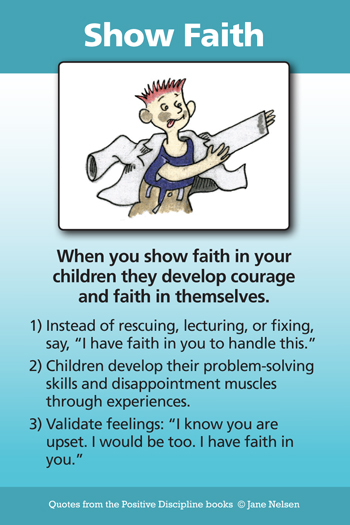One of the biggest mistakes some parents and teachers make, when they decide to use Positive Discipline, is becoming too permissive because they don’t want to be punitive. Some mistakenly believe they are being kind when they rescue their children, and protect them from all disappointment. This is not being kind; it is being permissive. Being kind means to be respectful of the child and of yourself. It is not respectful to pamper children. It is not respectful to rescue them from every disappointment so they don’t have the opportunity to develop their disappointment muscles. It is respectful to validate their feelings, “I can see that you are disappointed (or angry, or upset, etc.).” Then it is respectful to have faith in children that they can survive disappointment and develop a sense of capability in the process. Offer support through Validating Feelings or giving a Hug, but not by rescuing or fixing.
TAKE TIME FOR TRAINING
It is important to Take Time for Training. Adults often expect children to accomplish tasks for which there has not been adequate training. This is more typical in homes than in schools. Parents may expect children to clean their rooms, but never teach them how. Children go into their messy rooms and feel overwhelmed. It may be helpful to clean the room with your children until they have more training. This is also a great way to create connection.
CURIOSITY QUESTIONS
Be sure and use Curiosity Questions. Instead of telling children what to do, ask curiosity questions. “Where do your dirty clothes go?” “What do we need to do before we can vacuum the floor?” “What do you need to do to get your work done on time?” Children are great problem solvers when we give them a chance.
PATIENCE
Patience is probably the most difficult part of showing faith in our children. It is almost always more expedient to solve problems for our children. This is particularly true when we are under time pressures. In these cases we can take time later to explore solutions for the future. Ask your children exploratory questions. “What happened?” “What caused it to happen?” “What did you learn?” “What can you do in the future?”
When time pressures are not an issue, practice having patience with your children. Allow them to problem solve on their own. Allow them to feel a little disappointment. Allow them to work through their feelings. They will need these skills in the future.
It may help to remember that who your children are today, is not who they will be forever. Someday they will be nagging their own children to put their dishes in the sink and to clean their rooms. Remember that example is the best teacher. Model what you want for your children, take time for training so they learn skills, have regular family meetings, and then have lots of faith in them to become the best they can be.
Tool in Action
Excerpt from Positive Discipline by Dr. Jane Nelsen
Billy, a first grader, forgot his lunch every day. Mother would interrupt her busy schedule to drive to school with his lunch. After learning about natural consequences, she decided that Billy might learn to remember his lunch if he experienced the natural consequence of forgetting. She first discussed this with Billy, letting him know she was confident that he could be responsible for remembering his lunch. She also told him she would no longer bring his lunch to school if he forgot it. It is very important and respectful to discuss, in advance, when you plan to change your behavior.
Her intentions were sabotaged for a while because Billy’s teacher took over and loaned him money for lunch when he forgot. It was not until Mother and Billy’s teacher got together on a plan to allow Billy to learn from the natural consequences of his choices that his behavior changed.
Billy tested the plan. The next time he forgot his lunch, he asked his teacher if he could borrow some lunch money. She said, “I’m sorry, Billy, but we agreed that you could handle your lunch problem by yourself.” Billy then phoned his mother and demanded that she bring his lunch. Mom also kindly but firmly reminded him that he could handle the problem. Billy pouted for a while, even though one of his friends gave him half a sandwich.
After that, Billy seldom forgot his lunch. When he did forget it, he managed to find someone who would share some food with him. By the time Billy reached the second grade, he added the responsibility of making his own lunch, as well as remembering to take it.
Many adults don’t have much tolerance for the whining, pouting and disappointment. Billy’s mother did not find it easy to listen to her child be demanding, and it was difficult for her to allow him to experience being upset. She noticed some guilty feelings because he was hungry, but reminded herself that forgetting his lunch was really just a small mistake, one of many Billy would make in his lifetime. If she did not follow through on her plan, he would not be learning the life skill of getting a little more organized in the morning, and the good feelings of handling a problem himself. Instead he would be learning that whenever things didn’t work out for him, he could whine or complain and get someone else to take care of his problems. Looking at it that way, Mother was able to stay calmer.


No Comments yet!